Immerse yourself in Charleston's unique blend where historic charm and Lowcountry cuisine converge, showcasing a rich cultural tapestry. Explore landmarks like the Dock Street Theater and the College of Charleston, steeped in historical significance. Lowcountry cuisine, influenced by Native American, African, and European traditions, highlights dishes like shrimp and grits and she-crab soup. Engage in culinary experiences through farm-to-table dining, cooking classes, and workshops, celebrating the region's agricultural legacy. Discover Charleston's diverse flavors and culinary heritage, reflecting a fusion of cultural influences. More insights await on Charleston's enticing history and gastronomic delights.
Key Takeaways
- Charleston's historic charm includes landmarks like Dock Street Theater and the Old Exchange Building.
- Lowcountry cuisine reflects African, European, and Native American culinary influences.
- Local ingredients such as rice, seafood, and vegetables define Lowcountry cuisine.
- Culinary fusion in Charleston highlights a blend of diverse cultural traditions.
- Culinary experiences in Charleston offer cooking classes, farm-to-table experiences, and diverse dining options.
Historic Landmarks in Charleston
Explore the rich history of Charleston through its iconic historic landmarks. Charleston Stage Company's Dock Street Theater stands as America's first theater, boasting a legacy of over 100 performances annually since its revival post the Great Fire of 1740.
The College of Charleston, founded in 1770, holds the distinction of being the first city-supported college in the nation, deeply ingrained in Charleston's educational tapestry.
The Old Exchange Building, with its underground dungeon utilized as a prison during the American Revolution, serves as a significant historic landmark in Charleston, encapsulating tales of the city's past struggles and triumphs.
These landmarks not only showcase Charleston's historical significance but also provide a glimpse into the city's cultural evolution over the centuries. From theatrical performances to academic pursuits and revolutionary incarcerations, these sites offer a window into Charleston's rich and vibrant history that continues to captivate visitors and locals alike.
Cultural Influences on Lowcountry Cuisine
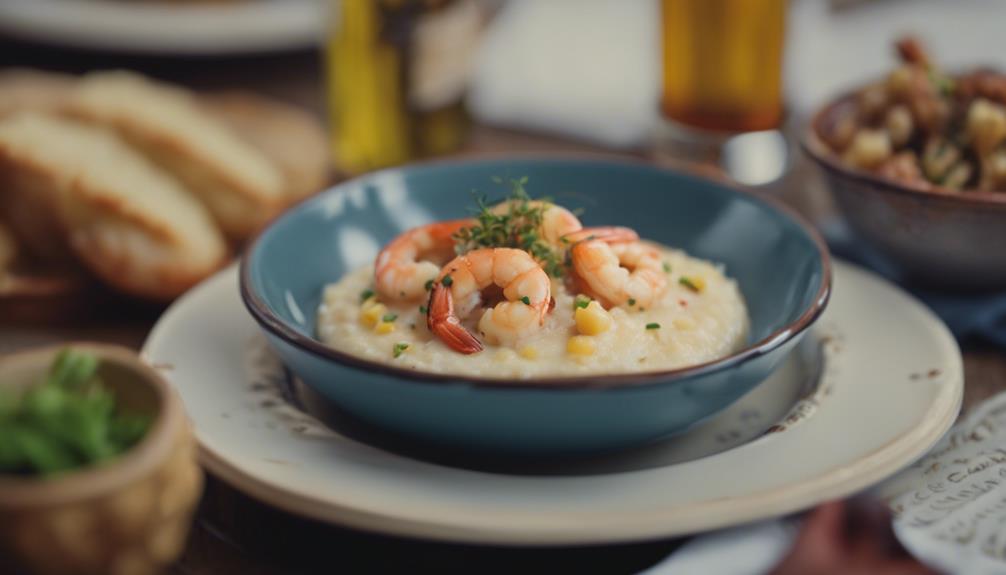
Lowcountry cuisine in Charleston is a rich tapestry woven from diverse cultural influences. Native American tribes like the Sewee and Catawba introduced staples like corn, beans, and game meats, while enslaved Africans brought rice cultivation and unique seasoning techniques.
The fusion of African traditions with local ingredients, known as Gullah-Geechee cuisine, alongside European influences and a focus on local ingredients, showcases the unique culinary heritage of Charleston.
Culinary Fusion Origins
Drawing from a rich tapestry of European, African, and Native American culinary traditions, the origins of Culinary Fusion in Lowcountry cuisine reflect a vibrant cultural amalgamation. Lowcountry cuisine in Charleston is a true representation of the historical cultural influences that have shaped the region's culinary landscape. The use of ingredients like rice, seafood, and vegetables not only highlights the diverse cultural influences but also showcases the unique flavors that have emerged from this fusion.
African cooking techniques, European spices, and Native American ingredients all play a significant role in defining the flavors of Lowcountry dishes. This blending of culinary traditions is a reflection of Charleston's rich history and heritage, demonstrating how the city's cultural melting pot has influenced its cuisine.
The distinct flavors and dishes found in Lowcountry cuisine serve as a reminder of the rich tapestry of influences that have come together to create this unique culinary experience.
African and European Influences
African and European influences have intricately shaped the vibrant flavors and culinary traditions found in Charleston's Lowcountry cuisine. Enslaved Africans in Charleston introduced rice cultivation techniques and seasoning traditions that heavily influenced Lowcountry cuisine. European settlers in Charleston brought culinary influences such as French, Spanish, and English cooking methods, which blended with African flavors.
The Gullah-Geechee people in Charleston preserved their West African culinary heritage through dishes like red rice and okra soup. Lowcountry cuisine in Charleston showcases a fusion of African and European culinary traditions, resulting in dishes like shrimp and grits and she-crab soup. Charleston's Lowcountry cuisine reflects the city's rich history of African and European cultural influences, creating a unique and flavorful culinary tradition.
The merging of these influences hasn't only shaped the culinary landscape but also serves as a tribute to the resilience and creativity of the Gullah-Geechee people and the early European settlers in the region.
Local Ingredients Showcase
Local ingredients play a pivotal role in shaping the distinct flavors and cultural influences evident in Charleston's renowned Lowcountry cuisine. The use of local ingredients such as shrimp, grits, okra, and sweet potatoes not only defines the essence of Lowcountry cuisine but also reflects a blend of European, African, and Native American culinary influences.
Rice, introduced by enslaved Africans, remains a fundamental component in many traditional dishes, underscoring the historical significance of these ingredients. Charleston's culinary heritage is vividly portrayed through signature dishes like she-crab soup, Hoppin' John, and the iconic shrimp and grits, which highlight the city's diverse cultural tapestry.
The emphasis on sourcing fresh, seasonal, and locally produced ingredients is a hallmark of Lowcountry cuisine. This commitment to quality ingredients not only enhances the flavors of the dishes but also pays homage to Charleston's rich culinary history, showcasing a deep connection to the region's bountiful resources.
Iconic Charleston Dishes to Try
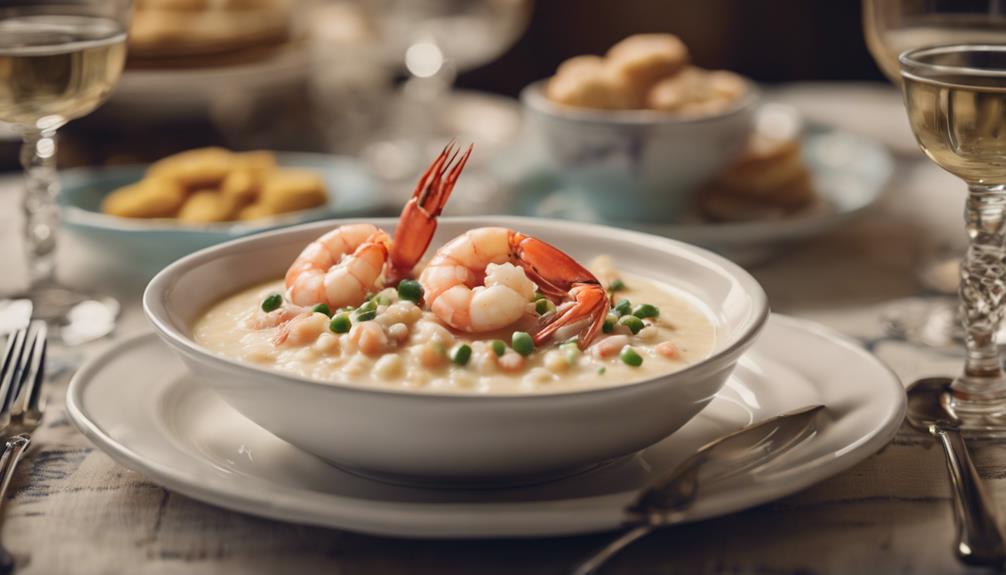
Explore the iconic dishes of Charleston that showcase the rich culinary heritage of the Lowcountry. When delving into Charleston's culinary scene, you'll encounter a variety of traditional Southern dishes that offer a taste of Southern comfort like no other.
Here are some iconic Charleston dishes you must try:
- Shrimp and Grits: A beloved dish featuring a delightful blend of fresh seafood and creamy corn grits, embodying the essence of Charleston's culinary tradition.
- She-Crab Soup: Indulge in this rich and creamy soup made with blue crab meat and crab roe, a classic example of traditional Southern flavors.
- Fried Green Tomatoes: Savor the crispy goodness of unripe tomatoes coated in cornmeal and fried to perfection, a popular choice among locals and visitors alike.
- Boiled Peanuts: Considered the caviar of the South, these savory boiled peanuts offer a unique texture and flavor that's a true Southern delicacy.
- Frogmore Stew: Experience the flavors of this traditional Lowcountry dish, a hearty stew featuring shrimp, corn, potatoes, and sausage cooked in a flavorful broth, providing a taste of authentic Charleston cuisine.
Culinary Tours and Experiences
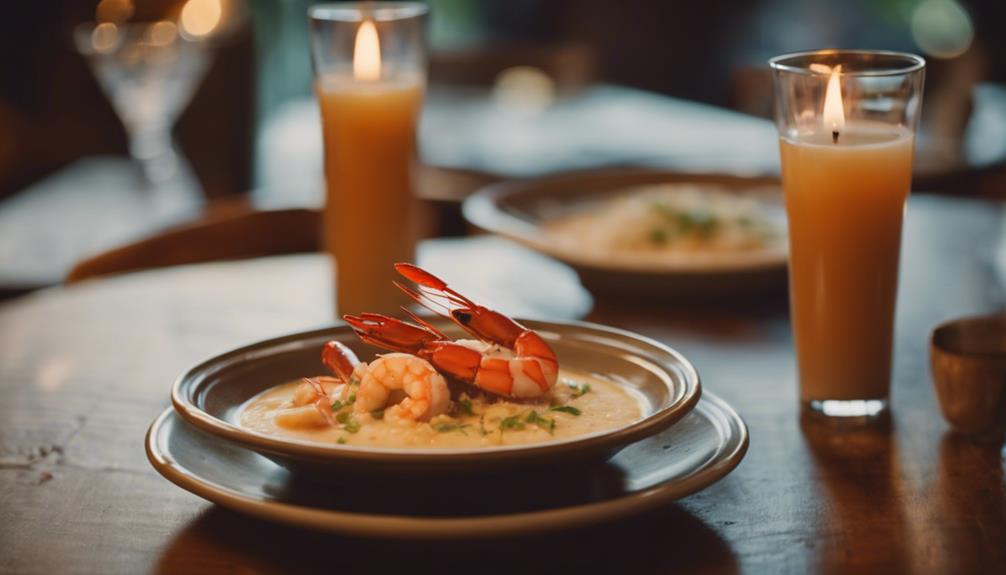
Explore culinary tours in Charleston to taste local delicacies, participate in cooking classes, and enjoy farm-to-table experiences.
These tours offer immersive opportunities to savor the rich flavors of the Lowcountry cuisine while learning about the city's culinary heritage.
From renowned dishes to hands-on cooking sessions, Charleston's culinary tours promise a delicious and educational exploration of the city's food scene.
Tasting Local Delicacies
Immerse yourself in Charleston's culinary treasures through immersive culinary tours that offer a thorough exploration into the city's gastronomic history and present-day delights. Tasting local delicacies on these tours provides a unique culinary experience where you can sample a variety of dishes while gaining insight into Charleston's culinary evolution.
Popular food tours like the Charleston Culinary Tours and the Gullah Cuisine Walking Tour showcase the city's rich culinary heritage and traditions, highlighting award-winning restaurants and local flavors. When booking a culinary tour in Charleston, you should check availability, review itineraries, consider dietary restrictions, and plan transportation for a memorable experience.
Explore Charleston's Culinary Evolution: Gain insight into the city's food scene through a variety of tastings.
Discover Local Flavors: Sample dishes that showcase Charleston's rich culinary heritage and traditions.
Award-Winning Restaurants: Visit renowned eateries that contribute to Charleston's vibrant food culture.
Guided Tours: Learn about the city's gastronomic history from knowledgeable guides.
Memorable Experience: Plan ahead for an unforgettable culinary adventure in Charleston.
Cooking Classes Offered
Looking to enhance your culinary skills and immerse yourself in Charleston's rich food culture? Cooking classes in Charleston offer the perfect opportunity to explore the world of Lowcountry cuisine and traditional Southern recipes. These classes not only provide hands-on experiences in preparing iconic dishes like shrimp and grits, she-crab soup, and Hoppin' John but also allow you to investigate the unique local ingredients that make Charleston's culinary heritage so special.
Led by experienced chefs and culinary experts, these cooking classes offer a blend of history, technique, and flavor, giving participants insights into Charleston's rich culinary traditions.
Whether you're a beginner looking to learn the basics or an experienced cook seeking to refine your skills, these classes cater to all levels of expertise. It's a fun and educational way to immerse yourself in Charleston's food culture while mastering the art of creating delicious Lowcountry dishes.
Farm-To-Table Experiences
Charleston's farm-to-table culinary tours and experiences offer a unique insight into the city's rich history and local ingredients. Participants in these immersive experiences can explore the vibrant food scene of Charleston through visits to local farms, markets, and restaurants.
Here are some key aspects of these culinary journeys:
- Connection with Local Farmers: These farm-to-table tours emphasize the close relationship between farmers, chefs, and diners, showcasing the journey of ingredients from farm to plate.
- Promotion of Sustainable Practices: By highlighting traditional cooking methods and sustainable practices, participants gain a deeper appreciation for responsible food sourcing.
- Support for Local Producers: These experiences underscore the importance of supporting local farmers and producers, contributing to the sustainability of the local food ecosystem.
- Exploration of Culinary Heritage: Culinary tours focusing on farm-to-table experiences offer a unique opportunity to investigate Charleston's rich culinary heritage through fresh, seasonal dishes.
- Tasting Fresh, Seasonal Delights: Participants have the chance to sample a variety of fresh, seasonal dishes, immersing themselves in the flavors of the Lowcountry.
Best Restaurants in Charleston
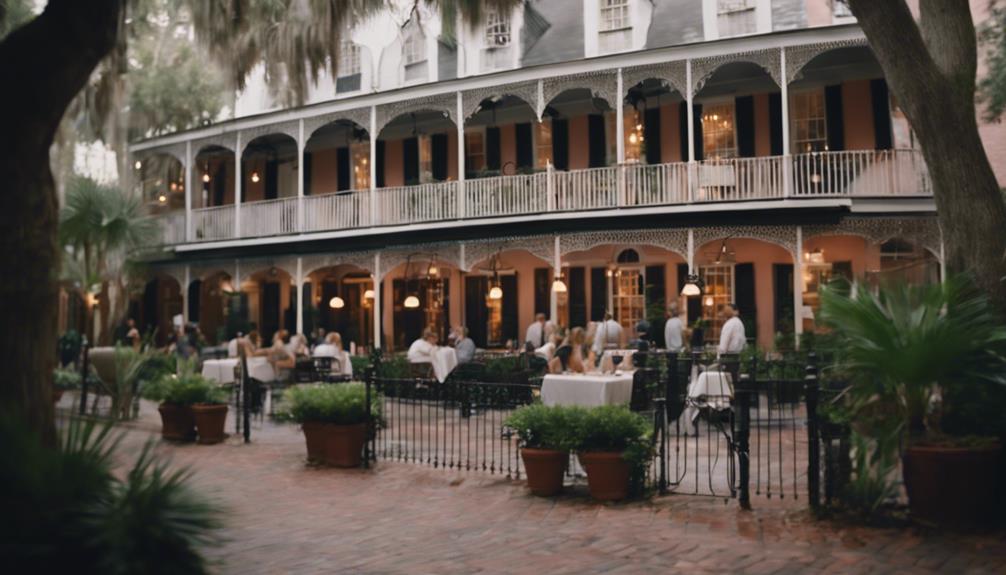
Discover the top culinary gems in Charleston with a diverse selection of the best restaurants to satisfy your cravings. Charleston's historic charm is deeply intertwined with its culinary narrative, reflected in the city's rich dining scene.
Renowned for its fresh seafood and Lowcountry cuisine, Charleston's restaurants beautifully blend European, African, and Native American influences to create iconic dishes like shrimp and grits, she-crab soup, and boiled peanuts. These local favorites not only showcase the city's rich history but also offer a taste of its diverse flavors.
Within Charleston's dining establishments, you'll find unique dishes such as fried green tomatoes and Frogmore stew, each telling a tale of the city's culinary heritage. Additionally, many of these restaurants embrace a farm-to-table concept, emphasizing the use of fresh, locally sourced ingredients in their dishes.
Charleston's vibrant food culture, coupled with events like the Charleston Wine + Food Festival, attracts visitors seeking to immerse themselves in the city's gastronomic delights.
Farm-to-Table Dining in the Lowcountry
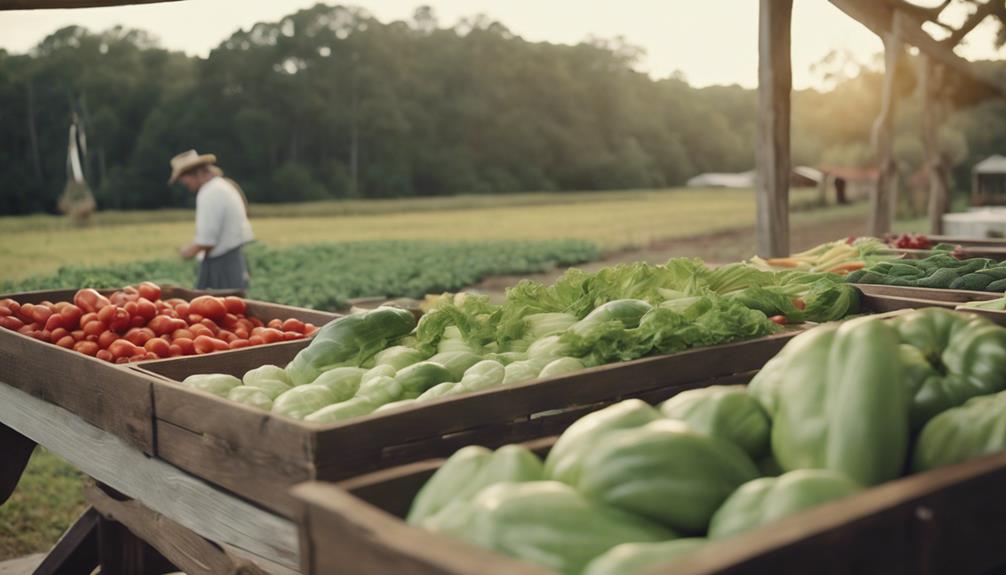
Immerse yourself in the vibrant farm-to-table dining scene of the Lowcountry, where restaurants in Charleston emphasize sourcing fresh ingredients locally to create sustainable and delicious dishes. Charleston's farm-to-table movement goes beyond just serving food; it's a commitment to supporting local farmers, showcasing seasonal produce, and fostering a deeper connection between what's on the plate and where it comes from.
Here are some key aspects of farm-to-table dining in the Lowcountry:
- Local Sourcing: Restaurants in Charleston prioritize obtaining ingredients from nearby farms and producers.
- Seasonal Showcase: The culinary scene in Charleston highlights the freshest seasonal produce, seafood, and meats available.
- Community Connection: Farm-to-table practices promote a conscious and transparent food system that benefits both diners and local farmers.
- Direct Relationships: Chefs often establish direct connections with growers through visits to farmers markets, ensuring quality and freshness.
- Culinary Heritage: By embracing farm-to-table principles, Charleston celebrates the region's agricultural legacy, offering a taste of authentic Lowcountry flavors and traditions.
Cooking Classes and Workshops in Charleston
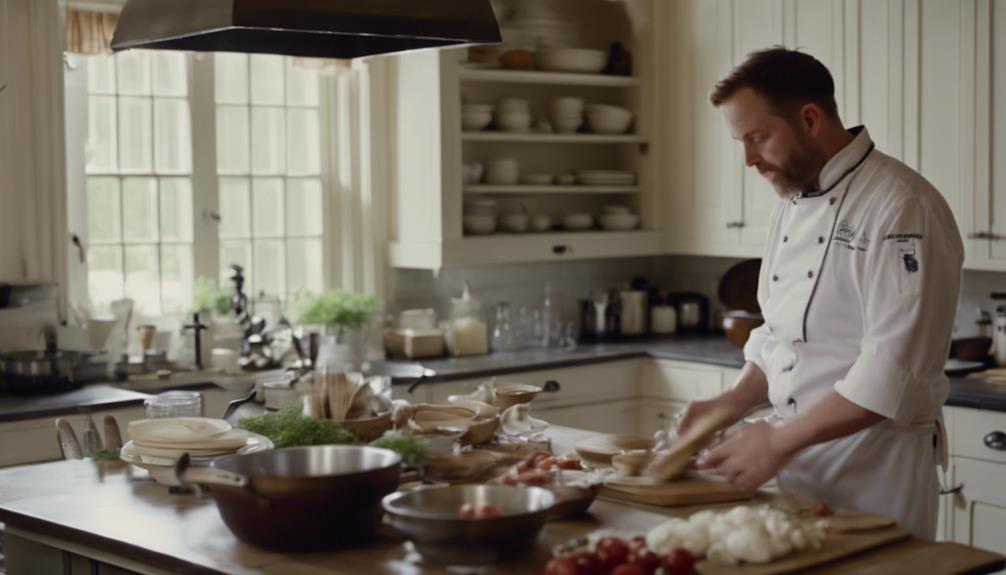
Discover the vibrant culinary scene of Charleston through engaging cooking classes and workshops that offer a hands-on experience in learning about Lowcountry cuisine. These classes explore traditional Southern cooking techniques, showcasing the rich tapestry of flavors that define Charleston's food culture.
Led by local chefs and culinary experts, participants have the opportunity to immerse themselves in the art of Lowcountry cooking, using fresh ingredients and time-honored recipes.
From mastering the intricacies of seafood preparation to perfecting the art of biscuit-making, these cooking classes cover a wide array of topics that celebrate the essence of Charleston's culinary heritage. Participants can also learn about the Gullah-Geechee influences that shape the region's distinctive cuisine, providing a deeper understanding of the cultural significance behind each dish.
Whether you're a seasoned home cook or a culinary enthusiast looking to expand your skills, these workshops offer a unique opportunity to connect with Charleston's food traditions while creating delicious dishes to savor and share.
Frequently Asked Questions
What Food Is Charleston, South Carolina Famous For?
Charleston, South Carolina is renowned for its vibrant food culture. The city is famous for its Lowcountry cuisine, a unique blend of European, African, and Native American culinary influences.
Iconic dishes like shrimp and grits, she-crab soup, and fried green tomatoes are beloved staples. Boiled peanuts, known as the 'caviar of the South,' and frogmore stew, a flavorful one-pot meal, are also popular delicacies.
Charleston's rich culinary history and diverse flavors attract food enthusiasts worldwide.
What Is Charleston, SC Known for Historically?
Charleston, SC is historically renowned for several significant firsts in America. It boasts the Dock Street Theater, the nation's initial playhouse.
The city is home to the College of Charleston, America's premier city-supported college.
Charleston also houses the first American museum, the Charleston Museum, modeled on the British Museum.
Of particular mention, the Old Exchange Building holds an underground dungeon utilized as a prison during the American Revolution.
Additionally, the Old City Jail was a detainment site for infamous criminals, including Lavina Fisher, the first U.S. female serial killer.
What Drink Is Charleston, SC Known For?
When in Charleston, SC, you must try the iconic 'Charleston Light Dragoon Punch.' This rum-based cocktail, originating in the 1700s, offers a blend of citrus, black tea, and spices.
Originally crafted by the Charleston Light Dragoons militia, it gained popularity during the Revolutionary War era. Today, it remains a beloved symbol of Charleston's heritage.
Explore various bars and restaurants in the city to savor this historic delight and immerse yourself in Charleston's rich past.
What Is Considered Historic Charleston?
When exploring historic Charleston, you'll encounter a tapestry of significant landmarks that weave together the city's storied past.
From the College of Charleston, the nation's first city-supported college, to the Charleston Museum, America's inaugural museum, each site speaks volumes about the city's commitment to preserving its history.
The Dock Street Theater and the Old Exchange Building, with its Revolutionary War dungeon, are just a glimpse into the rich tapestry of Charleston's historical fabric.
Conclusion
To sum up, Charleston's historic charm and lowcountry cuisine offer a unique blend of cultural experiences and culinary delights.
From exploring historic landmarks to savoring iconic dishes, there's no shortage of opportunities to immerse yourself in the rich heritage of this charming city.
Whether you choose to dine at top restaurants, take a culinary tour, or participate in a cooking class, Charleston's food scene is sure to leave a lasting impression on your taste buds and memories.










